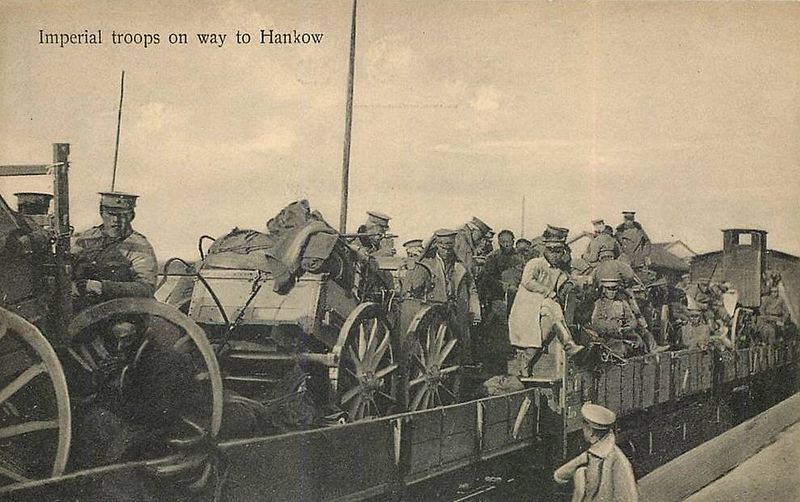Today in History - October 11
• Venetians repulse Milanese attack
• Peter the Great becomes Czar of Russia
• Revolution breaks out in China
-- Compiled by James Finlayson-Bald
 Chinese Imperial troops sent to recapture Hankow from the republican rebels in 1911. This battle was part of the Revolution of 1911 that overthrew China's last imperial dynasty (the Qing or Ching Dynasty) and ushered in the Republic of China under President Sun Yat-Sen.
Chinese Imperial troops sent to recapture Hankow from the republican rebels in 1911. This battle was part of the Revolution of 1911 that overthrew China's last imperial dynasty (the Qing or Ching Dynasty) and ushered in the Republic of China under President Sun Yat-Sen.
Image source: Postcard published in 1911.
On this date:
1427 —The Venetians under Francesco Bussone, known as Carmagnola, in a strong position near Macolo, were attacked by the Milanese under the colourful Sigismondo Malatesta ("the enemy of God and man" according to Pope Pius II, who was miffed because Sigismondo had converted the Cathedral of Rimini into a temple of the arts). The Venetians repulsed the attack, and, assuming the offensive, surrounded Malatesta and compelled him to surrender with his entire force of 10,000 men.
1573 —Admiral Dirkzoon's fleet of 25 sail, off Zuyder Zee, was attacked by Count Bossu's Spanish fleet of 30 sail. Five Spanish ships were promptly sent to the bottom causing the rest to flee, apart from the Count's ship which fought on until she had lost three-quarters of her crew.
1687—The Diet of Pressburg recognised the Crown of Hungary as hereditary in the male line of the Habsburgs. The line began in 1273 and continued for 468 years until the death of Charles VI of Austria in 1740.
1689— Peter (the Great), one of Tsar Alexi's 16 children, became Czar of Russia. He led Russia out of the mediaeval world, reformed the church, government and the army; the currency, alphabet and calendar; and enforced European customs and dress. He was the first Czar to travel outside Russia and arrived in London in 1698. He used the writer, John Evelyn's house in London and when he left Evelyn complained of "how miserably the Tsar of Muscovy has left my house."
1779—Count Casimir Pulaski died at sea two days after being wounded in the battle Savannah. A Polish patriot, he went into exile in 1772, sailed for America, joined Washington's army and distinguished himself in the battle of the Brandywine. He was made a Brigadier-General by Congress and raised a mixed corps called the Pulaski Legion with which he later defended Charleston. Congress voted a memorial but it was never built.
1911—A revolution broke out at Hankow in China and the ex-Premier Yuan Shi-'ai, who had fallen victim to a Palace intrigue in 1909, was recalled in an attempt to retrieve the situation; but it was too late, the mob was mafficking about crying "Death to the Manchus" and other ungrateful sentiments. The arch-revolutionary, Sun Yat-sen, rushed over from America for the kill and on January 1, 1912, at Nanking, was proclaimed president of the new republic. In February the Empress-Dowager and the Emperor abdicated and the country fell into anarchy.
Today's birthdays:
-- James Barry, artist (1741-1806)
-- Jerome Robbins. choreographer (1918-).
Thought for today:
If thou hadst not gone abroad and hearkened to idle rumours, thou wouldst the better have preserved a happy peace of mind. But since thou deiightest sometimes to hear novelties, it is fit thou suffer for it some disquietude of heart — Thomas à Kempis
The above article was written by James Finlayson-Bald.
Edited and illustrations added by David Paul Wagner.
|
